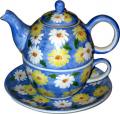Rooibos tea is tea made from the rooibos plant. The name "rooibos" (pronounced "roy-boss") originates from South Africa and is Afrikaans for "red bush".
Despite this name, the live rooibos plant is not red in color, and is actually green until fermented. Only then does it take on its distinctive appearance as narrow, red, twig-like leaves.
Rooibos tea is currently quite popular in the United States. It is known to have similar antioxidant properties to tea made from traditional tea leaves, but without the caffeine content. Rooibos tea is often marketed as Red Tea.
Rooibos tea is brewed like most conventional tea by pouring hot water over the leaves. Rooibos tea is a versatile tea that can be drunk both hot and cold. Milk can be added at the drinker's discretion.
Processing of rooibos tea
The rooibos plant is firstly harvested, and then the leaves bruised and finely chopped. Afterwards it is wet and allowed to ferment in rolls or mounds. When the fermentation has finished, the leaves are dried in the sun.
The fermentation process enriches the flavor of the tea, and also imparts its red appearance.
Health benefits of rooibos tea
Various scientific researches have found that it contains a flavonoid called Aspalathin, which can be used to treat skin and circulatory disorders. Rooibos tea also contains trace elements of fluoride (important for maintaining strong, healthy teeth), calcium (for maintaining bones) and manganese.
Rooibos tea contains oligosaccharides, a sugar compound that may aid the immune system in fighting viral infections.
The antioxidants found in rooibos tea may help prevent cancer, as they prevent the cells from damage. Damage to cells is a precursor to cancer.
The following health benefits have not yet been supported through scientific studies, but have been reported by some drinkers of Rooibos Tea:
- Anti-inflammatory properties.
- Anti-allergic properties, making rooibos tea beneficial for hayfever and asthma sufferers.
- Relaxing properties, that can aid sufferers of insomnia and nervous tension.
- Relief of digestive problems such as constipation, stomach cramps and colic in infants.
- Easing of skin conditions such as acne, eczema and nappy/diaper rash.
